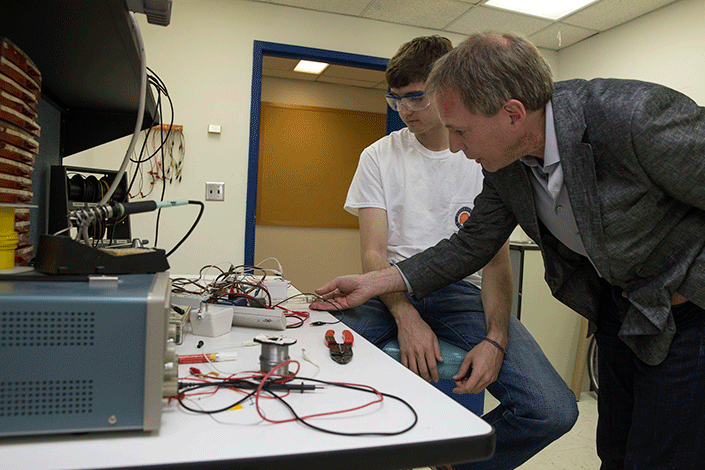At universities around the country, many students meet with their academic advisers once per semester, typically for 15 or 30 minutes. In a pilot advising program at the University of Virginia’s School of Engineering and Applied Science, first-year students see their academic advisers at least three times per week, and often more.
It’s not hard to guess which model creates stronger relationships.
Instead of randomly pairing first-year students with faculty advisers, the pilot program this year used the required “Introduction to Engineering” course to build stronger advising relationships. Participating faculty members were designated academic advisers for the approximately 40 students in their section. They saw their advisees in three classes each week, made themselves available outside of class and got to know each advisee long before the official advising and enrollment period eight weeks into the semester.
For first-year engineering student Annie Goodstein, the new structure created a more comfortable relationship with her adviser, Susan Donohue, a lecturer in the Department of Engineering and Society.
“Getting to know Professor Donohue throughout the course of the semester through her class definitely eased my mind when it came time to enroll in classes,” Goodstein said. “I was comfortable going to her with any questions I had about classes, and I knew she had my best interests at heart.”
Donohue observed that students in the pilot program “were better prepared” to make decisions about future class enrollment and seemed calmer, “because we did have that existing relationship.”
The pilot was based on proven success of the College of Arts & Sciences’ College Advising Seminars, or COLAs. These one-credit courses – 80 percent academic and 20 percent advising – pair first-year students with their faculty adviser for classes on subjects from Hemingway and Kafka to the intricacies of the cardiovascular system. Now sponsored in part by the U.Va. Parents Fund, more than 60 COLA seminars were offered this year.
The COLAs have been “amazingly successful,” said Archie Holmes, vice provost for educational innovation and interdisciplinary studies. “Pretty much on any measure that we looked at, in terms of what the students were expecting from their advisers, COLA students had a better experience than those not in COLA seminars.”
Given that success, Holmes, also professor of electrical and computer engineering, was eager to expand the concept to the Engineering School. Approximately half of the sections of “Introduction to Engineering” participated in the pilot. The approach is part of President Teresa A. Sullivan’s strategic plan, which outlines a “total advising” strategy combining high-quality academic, career and personal advising.
William Guilford, an associate professor of biomedical engineering who taught one of the pilot sections, observed that those students “felt comfortable coming to me with an issue that they might have, whether it be a joy in life, an academic challenge, a problem with classes or advising-related issues.”
“Anything from the really great to the really bad, they felt comfortable coming to me with that, and at a level that I have never seen out of first-years before,” Guilford said. He expects these relationships, formed in students’ first semesters, will continue throughout their college careers.
Guilford compared outcomes in his pilot section with sections that included additional brainstorming time instead of in-class advising. He found that students in the advising section were more likely to meet with him often, but students who spent more time brainstorming saw substantial increases in psychometric factors like creativity and self-efficacy. The research, which he plans to present to the American Society for Engineering Education in June, suggests that both the new advising structure and additional focus on brainstorming and experiential learning could be helpful for first-year engineers.
The new advising model, Guilford said, was also more satisfying to him as an educator.
“I don’t like when my students are, either way, suffering or beating the world, and I don’t know about it,” he said. “I don’t like that disconnect at all, and I would say that this went a long way toward fixing it.”
The Engineering School hopes to expand the program next year, perhaps incorporating other required first-year courses. James Groves, director of the Engineering School’s first-year program, will lead that expansion and manage faculty advising loads and support.
Outside of scheduled advising meetings, Groves envisions the new advising structure deepening U.Va.’s residential learning environment, encouraging informal, spur-of-the-moment interactions and creating even more opportunities for strong personal connections.
“It breaks down barriers, even if they are small ones,” he said. “Break them down, and all of the sudden students just become more comfortable, more confident, more informed and hopefully, then, more successful.”
Media Contact
Article Information
April 27, 2015
/content/pilot-program-brings-total-advising-overhaul-engineering-school

